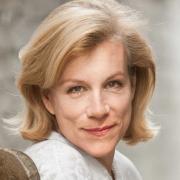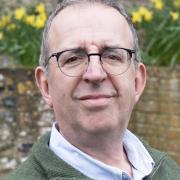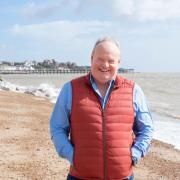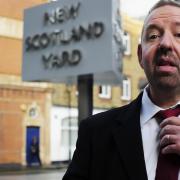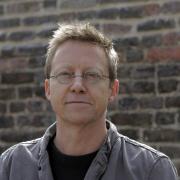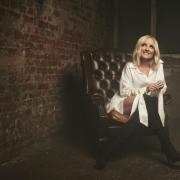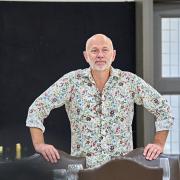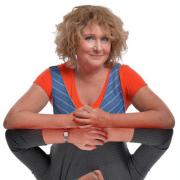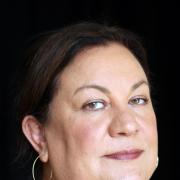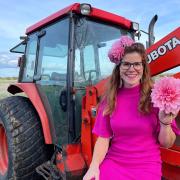Suffolk-based war correspondent Sam Kiley has reported from the world's most hazardous conflict zones. In his book, Desperate Glory, he describes the bravery of our troops and the full horror of the war in Helmand
In the thick of it
Your new book Desperate Glory has garnered fulsome praise from all quarters, has that surprised you?I have been delighted by the reaction of the critics. Above all have been the private messages from men and women who were there with me. I was most afraid that it would fail the test of authenticity and truth for them. All, from SAS officers to drivers, have been kind enough to say that it told their story as it was. I would love lots of sales but in the final analysis this is the best result for me.
Can you describe the war zone to the millions at home who can only follow it on the television? One of the biggest descriptive challenges was to get across the heat. An average of 50 centigrade during the day – all day. Try running a marathon in an Arctic ski-suit…
Your respect for the British soldier must be immense… It is, but I’m also not gaga about soldiers. Of course, I grew to like many and in some ways love them all. I lived and patrolled with them on the front line. Most, almost all, were half my age. They were consistently gracious towards me and incredibly giving to one another. War generates a special kind of love between those who fight it together. Witnessing that was a very special privilege.It’s too easy to say, as politicians do, ‘I have the deepest respect for our armed forces’. I say to those that say this “then stop being a chicken**** and join up,” or, “send your sons and daughters to the front,” that would be a sign of real respect. Oh, yes, and arm them properly and take some time to think about what you’re doing when you send them out to kill and die.
Fellow journalist Fergal Keane says there is madness in your bravery. Is he right and what are you thinking when you are in the thick of the action?There is a bit of ‘madness’ in anyone who goes to war either as a soldier or a correspondent. If you do it for as long as I have then even one’s friends think one is a bit ‘touched’. But in truth there’s no point in going to war as a voyeur. Sometimes one has to go beyond the bounds of what is considered an acceptable risk (whatever that is) to establish truth. That’s the whole point of the job. When things get wobbly, I address a lot of very rude words towards myself while I simultaneously go very cold and calculating, so that I can get back to a good pub and celebrate being alive. Coldness is what one needs when bullets are flying. I am thinking nothing more than, where’s the best cover, where is the shooting coming from, what are the escape routes, how do I make sure I don’t get pinned down or fixed, and so on – basic infantry skills.
What did you think of theOscar-wining film on a bomb disposal team in Bagdhad, The Hurt Locker?Much less authentic than Generation Kill or Over There, both TV series. An all around disappointment – an absurd view of bomb disposal people, which manages to miss on every level - dramatically and as a reflection of any kind of reality. The vignette of panicky SAS soldiers relying on bomb disposal engineers to defend them against snipers was just daft. I am amazed it won those Oscars.
You briefly mention a Scottish soldier who lives in Suffolk in the book. Do you meet many East Anglian soldiers? There are two officers from the Argyll and Sutherland Highlanders, Andy Rogers and Beatie Barclay MC, who live in Snape near my home. Both were at Woodbridge School. I also ran into an SAS officer who used to live in Leiston, and many hundreds based in Woodbridge and Colchester, which is the headquarters of 16 Air Assault Brigade, and of course the Apache pilots and crews are at Wattisham. Where else in the world have you reported and what has been the trickiest/most dangerous situation you have been in? I managed to get myself shot during a small coup in Lesotho. I was kidnapped and taken into the desert near Fallujah in Iraq to be murdered. The latter was the most terrible experience of my life. Covering the Rwandan genocide was very deeply scarring but oddly, because I was not a target of the state’s organised slaughter, not terribly dangerous. The Somali civil war was chaotic and I lost a lot of colleagues there but we all rather enjoyed it. The food and living conditions in the Balkans were, after Africa, very convivial. I’m ducking around the question here because the kidnapping was very traumatic – I wrote a piece about it in The Spectator, which I tend to point people to, because I really don’t like having to think about it. In short, I knew I was going to die and I was right. That I was not killed was due to a series of flukes which occurred at the moment of my execution. Enough said.
How do your family cope when you are away? Melissa, my wife, is the noblest and strongest and, luckily, also the most beautiful and clever person I have ever met. She has one flaw, a terrible taste in husbands. She spends much of her life living as a single parent of Ella, 12, and Fynn, 10. Our children are kind enough not to tell me that they miss me and I don’t think they worry very much. Fynn is unimpressed that I was not armed when I went to Helmand for six months! It is hard on them all, though, and if someone could offer me a column on shooting, gardening, hedgerow foraging or anything that would pay the bills then they’d be doing us all a favour.Hardest of all for Melissa is my return when I’ve been away because I upset the routines she’s established and I am usually pretty rough and clumsy. It feel like I have huge arms and hands and am often in danger of sweeping precious, fragile things on to the floor with them. How often are you overseas? It varies, up to nine months of the year at most.
Any tips for budding war correspondents? Go and get a proper job – or one in the City where you have a licence to gamble and can retire at 40 and then play at anything you like. The life of a so called ‘war correspondent’ is not for grown-ups. It’s badly paid, sometimes dangerous, and might lead you into the nut house. On the other hand, someone else pays you to have adventures, you’ll have more sex when you’re single than an accountant, and pick up some bizarre diseases which, when you describe them, will cause instant silence at dinner parties. If that sounds like what you’d like – then grow up. If you can’t, then, well, get on with it.
I take it being an office-based journalist isn’t for you? Actually, I would love to be back in a newsroom for a while. The energy of newspaper production is electrifying. It’s also fun being surrounded by bright people with very diverse experiences and skills. I’m also old enough to enjoy passing knowledge on to the next generation and enjoy seeing them flourish. A regular income would be a welcome bonus too.
What do you like about Suffolk?I love the light. I love the vast skies. I love that it’s not chocolate box England and that there are no clotting tea shops. I love the gentle kindness of the people here and the fact that it attracts un-rich and interesting folk into its landscape, and hangs on to them. Living on the Alde, the endlessly rolling landscape is a match for anywhere else I have been. Above all, we have made the most wonderful new friends here, who feel like they’ve always been part of our DNA. Melissa’s family have been here for years. We’ve built a family home and I don’t think we will ever leave.
Desperate Glory: At War in Helmand with Britain’s 16 Air Assault Brigade by Sam Kiley (Bloomsbury �18.99).



